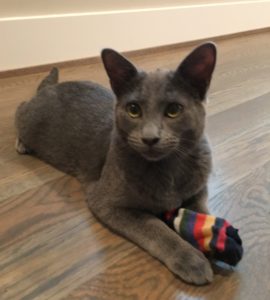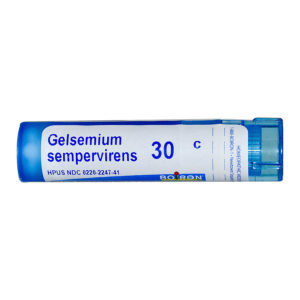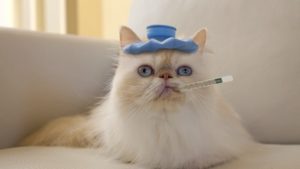Welcome Home! Your New Shelter Cat Now Has the Kitty Flu
Upper respiratory disease in cats: inevitable in shelter cats?
You finally found your new cute, little furry soulmate at your local animal shelter or rescue organization. All the necessary preparations have been made: cat bed, litter box, litter, toys, cat food, cat treats, scratching post, kitty condo… Your heart is exploding with love and happiness as you welcome your new bundle of joy home, anticipating all those wonderful bonding moments of playtime and endless cuddling. And then it happens….Achoo!
One sneeze quickly turns in to multiple, her eyes and nose start to run, her nose becomes stuffed up, she starts running fever, and all she wants to do is sleep. She is becoming more miserable by the day, and her appetite may be decreased or gone, too. How could this happen? Why is your cat sick when she seemed fine at the shelter?
This scenario happens all the time, and pet parents who adopt from shelters should be advised ahead of time that this will probably happen. It can also happen when you get kittens or cats from large catteries, too. This has happened to me several times over the years after adopting cats.
Why does this happen?
When large amounts of cats are kept together it’s very easy to develop and pass around upper respiratory viruses. They’re in a stressful environment, space is limited, cats may groom or hiss at each other, and the stress of it call can quickly weaken a cat’s immune system.
Kittens who haven’t had their first series of shots, elderly cats and pregnant cats are most susceptible, and highly infective viruses can spread easily through eye, nose and mouth secretions. Therefore, when one kitty gets sick it’s just a matter of time before others will, too.
Diagnosis: kitty flu & feline upper respiratory infections

Bruno
My friend, Nicole, recently adopted a couple of new kittens, Bruno and Mabel, from the Houston SPCA, and Bruno got sick shortly after. She came to me seeking advice. She’d already taken him to the vet who told her there’s nothing they can really do because he was diagnosed with FHV-1, feline herpes virus. If secondary infections develop they would treat those with antibiotics and other meds, but until then she’d have to wait it out.
According to Dr. Karen Becker, DVM,
There are several different bacteria and viruses that cause upper respiratory disease complex in felines. The two most often implicated are feline herpes 1, also known as rhinotracheitis, and calcivirus.
Other causes can be an infection with bordetella, mycoplasma, reovirus, chlamydia or pasteurella. These diseases can also develop as secondary infections to a primary infection with rhinotracheitis or calcivirus.
Feline upper respiratory viruses are typically diagnosed by your veterinarian with a polymerase chain reaction (PCR) test. It’s very important to determine which virus is present, because symptoms of other serious illnesses like heart disease, asthma and certain fungal infections can mimic those of an upper respiratory infection.
Empower yourself! Natural remedies can help
No pet parent likes to feel helpless when it comes to their pets. We hate to see our babies sick and suffering! It can take anywhere from one to four weeks for a virus to shed, so here are a few things you can do in the meantime.
Homeopathy
Have some homeopathic remedies on hand: Aconite 30c can be given at the onset of any symptoms every half hour for three hours. Gelsemium 30C is indicated for most “flu” symptoms. Other remedies that may be indicated are Ferrum Phos 6C, Phos Acid 30C, and Cinchona 30C particularly with dehydration. How do you determine which is the best for your cat? Muscle testing! This will also help you determine dosage protocols.
Get a vaporizer
Have a vaporizer on hand. If your cat is so congested that it can’t smell chances are good that she won’t want to eat. This can lead to a life threatening condition called hepatic lipidosis. Put your cat in a small, enclosed space like a bathroom, and turn on the vaporizer. This is a great tool to help break up congested airways and mucus and help your cat breathe easier.
Colloidal Silver
Keep some high quality colloidal silver on hand. You can find some great brands at Whole Foods or even a natural health clinic or store. Colloidal silver is a great immune builder and works well for conditions that may call for treating infections. It tastes like water and is safe to use with cats. I use a syringe (without the needle!) to administer liquid meds like this. Usually 1/4-1/2 ml a couple times a day (muscle test for accuracy!) for a few days can help build the cat’s immune response.
Baby food and raw goat’s milk
Keep some Gerber baby food meat on hand in case your cat loses interest in her cat food. More often than not they will eat the baby food, and I like to use it to mix in meds or supplements, too. You can also try using raw, grass-fed goat’s milk with a syringe to get some nourishment down until her appetite returns.
Probiotics
Get a high quality probiotic for pets. The healthier their gut, the stronger their immune system! Cats can benefit from a daily dose of probiotics mixed into their food, not just when they’re sick. The best probiotics are the ones with the highest numbers of strains of bacteria. There are lots of good ones out there, but I’m currently using Complete Probiotics for Pets from www.healthypets.mercola.com.
Other products that may prove helpful
Dr. Becker also regularly uses “homeopathic nosodes, immune-boosting medicinal mushrooms and herbs, including olive leaf, Cat’s Claw, Pau D’arco and turmeric, as well as lysine to treat upper respiratory diseases in cats and shorten the duration of these infections.”
Help for Bruno
For Bruno’s case I was able to muscle test to determine the best way to help him shorten the duration of the virus. He needed a remedy of Gelsemium 30C dissolved in purified water, 1/4 ml four times a day for two days; a 1/4 ml of colloidal silver twice a day for two days; and a probiotic added to his food. And lots of TLC from his family as he recuperated, which I’m sure was the best part!
Eventually our cats do heal, it just takes time. We can give them an extra edge by giving them the tools that best benefit their bodies to bring about healing.


